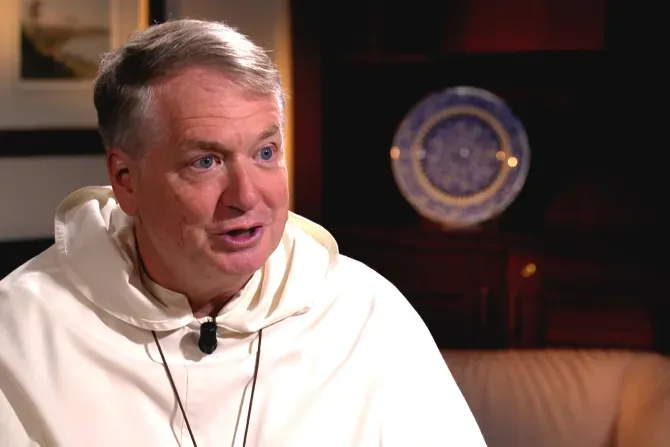“So you don’t know if that’s the enthusiasm of one or two people at each table or an enthusiasm that’s really held by nearly the whole room,” he said.
Archbishop Fisher told EWTN News he thinks the synod could be an opportunity to talk about bigger issues in the Church today, like how many young people are saying that they have no religion at all.
“It is much more urgent, in the end, so much more serious than tinkering at the edges about whether 0.001% of women might be deaconesses or lady women deacons,” he said.
“It’s trivial compared to the huge loss of faith that we have happening particularly in whole generations at the moment.”
He added that when people lose their faith, they go elsewhere to look for meaning, and “people go to a lot of very destructive places searching for meaning and hope and happiness.”
(Story continues below)
“For their sake, we’ve got to be much more active in evangelizing our culture and especially our young adults,” he added.
“What I’d love to come out of the synod would be an enthusiasm for bringing the faith back to people that should have it and for whatever reason are disconnected,” he said.
‘This synod is an experiment’
Fisher, who has served as the archbishop of Sydney for nearly a decade, noted that the Synod on Synodality is “quite different” from the previous Synod of Bishops that he attended.
He described the entire process as “an experiment,” adding: “It raises all sorts of quite serious theological questions.”
The Synod of Bishops set up by Paul VI after the Second Vatican Council was “intended to be an expression of episcopal collegiality of the college of bishops together,” he explained, “like the group of the apostles together … and in particular their magisterium, their teaching together."
Whereas the Synod on Synodality is more like “a hybrid” of the Synod of Bishops and other types of Church gatherings and meetings with bishops, priests, religious sisters, and laypeople.
“It’s both being a Synod of Bishops and being an ecclesial gathering all in one. And there are questions that it raises. So what is its ecclesial nature? What is its authority? … Is it trying to be the bishops like the gathering of the apostles? Or is it trying to be the gathering of all the baptized?”
“I think we need to do probably a lot more thinking about, well, what does all that mean ecclesiologically, canonically, practically?”
Fisher said that there is also discussion about the proportion of laypeople, particularly women, in the Synod on Synodality.
“There’s more women than there’s ever been before and yet [the synod] is still copping a lot of criticism that it still doesn’t have enough women,” he noted.
The Australian archbishop added that one of the upsides of the Synod on Synodality has been the wide range of Catholics from across the globe gathered together at the Vatican this month.
“I’ve met a bigger range of bishops in the last two weeks than probably in my previous 20 years. And that has to be a positive,” he said.
Courtney Mares is a Rome Correspondent for Catholic News Agency. A graduate of Harvard University, she has reported from news bureaus on three continents and was awarded the Gardner Fellowship for her work with North Korean refugees.








